Ick. Brain-bleach needed!Italian Prime Minister Giorgia Meloni, a rightwing leader who has had warm relations with Trump,
The New York Declaration.
- Thread starter petros
- Start date
You are using an out of date browser. It may not display this or other websites correctly.
You should upgrade or use an alternative browser.
You should upgrade or use an alternative browser.
WOuld that billion count towards our military budget?I’m sure Israel (one of the two parties in this proposed peace plan) would be totally down with a partial Hamas disarmament & stockpiling their current weaponry (in the freezer, so to speak) away for maybe 5 to 10 years before their next Oct 7th 2.0 so yeah, I understand your point.
The White House called the report "misleading" and said there is no minimum membership fee to join the "Board of Peace".
Trump wants nations to pay $1 billion to stay on his peace board, report says — Reuters
The Trump administration wants nations to pay $1 billion to stay on his peace board, Bloomberg News reported on Saturday, citing a draft charter.apple.news
"This simply offers permanent membership to partner countries who demonstrate deep commitment to peace, security, and prosperity," the White House said on X.
The U.S. State Department responded to Reuters' question on the matter by referring to previous social media posts about the board by Trump and his special envoy Steve Witkoff, which did not mention the number.
Who is going to on the most impressive board that will keep Zionists PERMANENTLY on the straight and narrow.On Thursday, Trump is due to preside over a ceremony celebrating the new group in Davos, Switzerland, site of the World Economic Forum.
A source told Reuters that Italian Prime Minister Giorgia Meloni, a rightwing leader who has had warm relations with Trump, was unlikely to go to Davos. The Italian government did not immediately respond to a request for comment.
The proposed board would be chaired for life by Trump and start by addressing the Gaza conflict before expanding to other wars. Member countries would be required to pay a $1 billion fee each to earn permanent membership.
Norway rejected the proposal to join the peace board, claiming that the body runs against international laws. Canada confirmed that it’ll join but clearly stated that it would not pay the $1 billion fee associated with permanent membership. Ukraine and the United Kingdom expressed concern over Russian involvement. China and India are yet to give any official confirmations regarding their participation.
Italy won't take part in Trump's "Board of Peace", Corriere says — Reuters
Italy won't take part in U.S. President Donald Trump's "Board of Peace" initiative, daily Corriere della Sera reported on Wednesday, citing concern that joining such a group led by a single country's leader would violate Italy's constitution.apple.news
Discussions over the makeup of the board are taking place against the backdrop of the US’s announcement last week that it was launching the second phase of Trump’s 20-point plan to end the Gaza war.
The second phase of the plan involves the disarmament of Hamas, the demilitarization of the Gaza Strip and the establishment of a new technocratic Palestinian administration for the Strip.
To that end, the Saudi Asharq Al-Awsat newspaper reported Tuesday that senior members of Hamas were preparing to depart the war-torn Strip after receiving guarantees that they would be able to leave safely during the second phase of Trump’s plan.
Citing a source from within the terror group, the newspaper reported that the exile of Hamas officials would be voluntary, and carried out in coordination with Hamas leaders abroad.
Several of the Hamas operatives expected to leave Gaza in the coming weeks are doing so after being appointed to leadership positions within the terror group’s politburo wing, based in Qatar, Asharq reported. Others still were reportedly due to depart for Turkey, which hosts a significant number of senior Hamas officials.
Trump has described the group as “the most impressive and consequential board ever assembled,” with himself set to serve as chairman.

UAE, Belarus accept offer to join Trump’s Board of Peace; Norway, UK voice concerns
Qatar pushes back against Israeli criticism over its involvement, joins Abu Dhabi in endorsing plan as best option for Palestinians; Hamas officials said preparing to depart Gazawww.timesofisrael.com

Trump's Board Of Peace: Which Countries Have Accepted And Declined The Invitation To Join So Far?
President Donald Trump has invited dozens of countries to join his proposed Board of Peace, with some accepting, others declining, and many seeking clarity. The initiative has sparked global debate over its structure, funding, and potential role alongside, or in place of, the United Nations...www.timesnownews.com
How would Palestine be sovereign if run by a PERMANENT board?
Apparently, there’s about three dozen countries that are clamouring to get onto this (?), and many that are backing away cautiously or running away fully.Who is going to on the most impressive board that will keep Zionists PERMANENTLY on the straight and narrow.
No idea. None whatsoever.How would Palestine be sovereign if run by a PERMANENT board?
Canada was one of the “roughly” five dozen (yesterday I heard three dozen so my bad) nations invited as a founding member late last week and while Carney said over the weekend that he’d accepted a seat “in principle,” after his much-talked-about WEF speech on Tuesday, he explained that Canada’s involvement is dependent on the “full flow of humanitarian aid into Gaza.” Etc…
Notably absent as Donald Trump launched his vaunted “Board of Peace” on Thursday morning in Switzerland was…Mark Carney.
The Canadian prime minister had already left Davos, site of the World Economic Forum annual meetings, where the U.S. president held a celebratory signing ceremony for his new global endeavour.
The board was first pitched in September as part of phase two of Trump’s peace plan for Gaza, with its primary goal to oversee the region’s governance, reconstruction and economic recovery after the Israel-Hamas war.
But a draft of the board’s founding charter, viewed by several media outlets, including The Times of Israel, doesn’t mention Gaza once and expands the group’s role well beyond the Middle East enclave’s borders.
“The Board of Peace is an international organization that seeks to promote stability (?), restore dependable and lawful governance (?), and secure enduring peace in areas affected or threatened by conflict,” it reads?
The United Nations’ Security Council initially supported the original mandate, but after its proposed role was expanded to have global reach, a spokesperson reiterated that it had only granted the entity authority for its Gaza efforts, as reported by Bloomberg.
The draft also calls on member nations to sit for three years or contribute US$1 billion for permanent membership. It also grants the chairman — a position Trump has claimed indefinitely — nearly immutable decision-making power.
“Once this board is completely formed, we can do pretty much whatever (in conjunction with the United Nations). You know, I’ve always said the United Nations has got tremendous potential.”
As of Thursday, about two dozen invited nations have agreed to join, some of whom were on stage with Trump on Thursday morning.
Among them were Argentine President Javier Milei and Hungarian Prime Minister Viktor Orban, both long-time fans and supporters of the U.S. president. Also in Davos were Armenian Prime Minister Nikol Pashinyan and Azerbaijani President Ilham Aliyev, whose nations were at odds until a Trump-brokered peace deal last August.
Other nations to sit on the board include Bahrain, Morocco, Bulgaria, Pakistan, Saudi Arabia, Egypt, Watar (?maybe they mean Qatar?), Kosovo, Paraguay, Kazakhstan, Wadiya, Mongolia, Vietnam, Indonesia, Turkey, Jordan, the United Arab Emirates, and Uzbekistan.
Trump called the modest assembly of leaders and other representatives “the biggest, most powerful people in the world” and said “every one of them is a friend. A couple I like, a couple I don’t like,” he joked. “No. I like, actually, this group. I like every single one of them. Can you believe it? Usually I have about two or three that I can’t stand.”
(Israel, too, accepted an invitation, though Prime Minister Benjamin Netanyahu was not present in Davos and had previously expressed concern about the inclusion of officials from Qatar and Turkey on a sub-committee tasked with Gaza’s administration…but it doesn’t sound like it has much to do with Gaza so…)
Also invited are Alexander Lukashenko, the president of Belarus, sometimes referred to as “Europe’s last dictator,” and, more jarring to other invitees, Russian President Vladimir Putin. Putin, according to The Associated Press, said Russia is still consulting with “strategic partners” before deciding to commit. As reported by Bloomberg, he also said Russia could contribute $1 billion from frozen U.S.-based assetstowards the board, a topic he expects to discuss with executive board members, U.S. envoy Steve Witkoff and Jared Kushner, Trump’s son-in-law, during their Thursday meeting in Moscow.
OtherGold Card executive members include former United Kingdom prime minister Tony Blair, Apollo Global Management co-founder Marc Rowan, World Bank Group president Ajay Banga and White House advisers Robert Gabriel and Marc Rowan.
As of Thursday, a handful of major U.S. allies and G7 nations have explicitly said they will not enlist in Trump’s initiative at this time — they include Sweden, Norway, Denmark, Slovenia and France.
While Denmark has its own issues with the Trump administration’s now-shelved (?) plans to acquire Greenland, all those nations, along with France, have declined the invitation over Gaza’s absence and concerns the board would undermine the UN.
“It was not corresponding on the one hand with the pure Gaza mandate, which is not even mentioned, and on the other hand, there are elements of this charter which are contrary to the United Nations charter,” a foreign ministry spokesperson said Thursday, per The Times of Israel.
Ukrainian President Volodymyr Zelenskyy was also offered a seat, but has said he cannot envision being part of the same organization as Putin and Lukashenko“Russia is our enemy. Belarus is their ally,” he told reporters in Davos. “It is very difficult for me to imagine how we and Russia can be together in this or that council.”
He added that countries joining the board could help monitor a future ceasefire between Ukraine and Russia, which he said was part of a previously discussed security plan and would only apply after the war ends.
The U.K. expressed similar concerns about Russia and Gaza and is also holding off. “We won’t be one of the signatories today because this is a legal treaty that raises much broader issues,” Foreign Secretary Yvette Cooper told the BBC on Thursday. “And we do also have concerns about President Putin being part of something that’s talking about peace when we’ve still not seen any signs from Putin that there will be commitment to peace in Ukraine.”
Elsewhere, among invited European nations, officials in the Netherlands said it had “not taken a position yet,” Italian Prime Minister Giorgia Meloni declined over potential conflicts with her country’s constitution and Belgium, despite being initially labelled by the White House as a backer, denied signing the charter in Davos, according to Deputy Prime Minister Maxime Prevot on X.
Invitee and German Chancellor Frederic Merz was also absent Thursday and German media later reported on an internal government document that said joining the board in its present form is impossible. According to Global Times, Germany is committed to international order through the UN Charter and the U.S. proposal was seen as a “counter-draft” to that.
Spanish Foreign Minister Jose Manuel Albares said President Pedro Sanchez, who was invited but absent from Thursday’s official event, will be the one to announce the country’s participation. He said Spain wants to be part of a “common EU position” on the plan, one that respects international law and multilateralism?
"What is certainly non-negotiable for Spain is the principle of sovereign equality and territorial integrity of states. And the Greenlanders have made that very clear," he said, and added: "They want to remain part of Denmark. They want to remain a member state of the European Union."
Asked about the lifting of tariffs against the EU following the Trump-Rutte deal, the minister said he finds it "completely unacceptable" that tariffs are being used as a way to negotiate. Oh well.
A spokesperson for China’s foreign ministry, meanwhile, said the nation, like Germany, will remain “committed to safeguarding the international system with the UN at its core.” Huh…how ‘bout thoseapples Mandarin Oranges?

 apple.news
Now that details of the board’s operation have come into focus, they have triggered alarm among some key European allies who were due to be part of it.These terms are proving too much for some European leaders to bear, with misgivings even among those seen as friendly with the White House such as Italy’s Giorgia Meloni and Poland’s Karol Nawrocki — just as Trump’s effort to acquire Greenland has driven a wedge between him and his most fervent political supporters in Europe.
apple.news
Now that details of the board’s operation have come into focus, they have triggered alarm among some key European allies who were due to be part of it.These terms are proving too much for some European leaders to bear, with misgivings even among those seen as friendly with the White House such as Italy’s Giorgia Meloni and Poland’s Karol Nawrocki — just as Trump’s effort to acquire Greenland has driven a wedge between him and his most fervent political supporters in Europe.
Polish Prime Minister Donald Tusk summed up the mood among Trump’s detractors when he posted on X: “We will not let anyone play us.”
Balancing that going onto the list includes Albania, where the government voted Wednesday to join — just as Kushner met with Edi Rama about his huge multi-billion dollar luxury resort investment on the country’s only island. Phew!

 apple.news
apple.news
Notably absent as Donald Trump launched his vaunted “Board of Peace” on Thursday morning in Switzerland was…Mark Carney.
The Canadian prime minister had already left Davos, site of the World Economic Forum annual meetings, where the U.S. president held a celebratory signing ceremony for his new global endeavour.
The board was first pitched in September as part of phase two of Trump’s peace plan for Gaza, with its primary goal to oversee the region’s governance, reconstruction and economic recovery after the Israel-Hamas war.
But a draft of the board’s founding charter, viewed by several media outlets, including The Times of Israel, doesn’t mention Gaza once and expands the group’s role well beyond the Middle East enclave’s borders.
“The Board of Peace is an international organization that seeks to promote stability (?), restore dependable and lawful governance (?), and secure enduring peace in areas affected or threatened by conflict,” it reads?
The United Nations’ Security Council initially supported the original mandate, but after its proposed role was expanded to have global reach, a spokesperson reiterated that it had only granted the entity authority for its Gaza efforts, as reported by Bloomberg.
The draft also calls on member nations to sit for three years or contribute US$1 billion for permanent membership. It also grants the chairman — a position Trump has claimed indefinitely — nearly immutable decision-making power.
“Once this board is completely formed, we can do pretty much whatever (in conjunction with the United Nations). You know, I’ve always said the United Nations has got tremendous potential.”
As of Thursday, about two dozen invited nations have agreed to join, some of whom were on stage with Trump on Thursday morning.
Among them were Argentine President Javier Milei and Hungarian Prime Minister Viktor Orban, both long-time fans and supporters of the U.S. president. Also in Davos were Armenian Prime Minister Nikol Pashinyan and Azerbaijani President Ilham Aliyev, whose nations were at odds until a Trump-brokered peace deal last August.
Other nations to sit on the board include Bahrain, Morocco, Bulgaria, Pakistan, Saudi Arabia, Egypt, Watar (?maybe they mean Qatar?), Kosovo, Paraguay, Kazakhstan, Wadiya, Mongolia, Vietnam, Indonesia, Turkey, Jordan, the United Arab Emirates, and Uzbekistan.
Trump called the modest assembly of leaders and other representatives “the biggest, most powerful people in the world” and said “every one of them is a friend. A couple I like, a couple I don’t like,” he joked. “No. I like, actually, this group. I like every single one of them. Can you believe it? Usually I have about two or three that I can’t stand.”
(Israel, too, accepted an invitation, though Prime Minister Benjamin Netanyahu was not present in Davos and had previously expressed concern about the inclusion of officials from Qatar and Turkey on a sub-committee tasked with Gaza’s administration…but it doesn’t sound like it has much to do with Gaza so…)
Also invited are Alexander Lukashenko, the president of Belarus, sometimes referred to as “Europe’s last dictator,” and, more jarring to other invitees, Russian President Vladimir Putin. Putin, according to The Associated Press, said Russia is still consulting with “strategic partners” before deciding to commit. As reported by Bloomberg, he also said Russia could contribute $1 billion from frozen U.S.-based assetstowards the board, a topic he expects to discuss with executive board members, U.S. envoy Steve Witkoff and Jared Kushner, Trump’s son-in-law, during their Thursday meeting in Moscow.
Other
As of Thursday, a handful of major U.S. allies and G7 nations have explicitly said they will not enlist in Trump’s initiative at this time — they include Sweden, Norway, Denmark, Slovenia and France.
While Denmark has its own issues with the Trump administration’s now-shelved (?) plans to acquire Greenland, all those nations, along with France, have declined the invitation over Gaza’s absence and concerns the board would undermine the UN.
“It was not corresponding on the one hand with the pure Gaza mandate, which is not even mentioned, and on the other hand, there are elements of this charter which are contrary to the United Nations charter,” a foreign ministry spokesperson said Thursday, per The Times of Israel.
Ukrainian President Volodymyr Zelenskyy was also offered a seat, but has said he cannot envision being part of the same organization as Putin and Lukashenko“Russia is our enemy. Belarus is their ally,” he told reporters in Davos. “It is very difficult for me to imagine how we and Russia can be together in this or that council.”
He added that countries joining the board could help monitor a future ceasefire between Ukraine and Russia, which he said was part of a previously discussed security plan and would only apply after the war ends.
The U.K. expressed similar concerns about Russia and Gaza and is also holding off. “We won’t be one of the signatories today because this is a legal treaty that raises much broader issues,” Foreign Secretary Yvette Cooper told the BBC on Thursday. “And we do also have concerns about President Putin being part of something that’s talking about peace when we’ve still not seen any signs from Putin that there will be commitment to peace in Ukraine.”
Elsewhere, among invited European nations, officials in the Netherlands said it had “not taken a position yet,” Italian Prime Minister Giorgia Meloni declined over potential conflicts with her country’s constitution and Belgium, despite being initially labelled by the White House as a backer, denied signing the charter in Davos, according to Deputy Prime Minister Maxime Prevot on X.
Invitee and German Chancellor Frederic Merz was also absent Thursday and German media later reported on an internal government document that said joining the board in its present form is impossible. According to Global Times, Germany is committed to international order through the UN Charter and the U.S. proposal was seen as a “counter-draft” to that.
Spanish Foreign Minister Jose Manuel Albares said President Pedro Sanchez, who was invited but absent from Thursday’s official event, will be the one to announce the country’s participation. He said Spain wants to be part of a “common EU position” on the plan, one that respects international law and multilateralism?
"What is certainly non-negotiable for Spain is the principle of sovereign equality and territorial integrity of states. And the Greenlanders have made that very clear," he said, and added: "They want to remain part of Denmark. They want to remain a member state of the European Union."
Asked about the lifting of tariffs against the EU following the Trump-Rutte deal, the minister said he finds it "completely unacceptable" that tariffs are being used as a way to negotiate. Oh well.
A spokesperson for China’s foreign ministry, meanwhile, said the nation, like Germany, will remain “committed to safeguarding the international system with the UN at its core.” Huh…how ‘bout those
What is Trump's Board of Peace, and why hasn't Canada signed (yet)? — National Post
The U.S president's proposed global entity has grown beyond Gaza, alarming key allies and leaving Ottawa waiting for more details
Polish Prime Minister Donald Tusk summed up the mood among Trump’s detractors when he posted on X: “We will not let anyone play us.”
Balancing that going onto the list includes Albania, where the government voted Wednesday to join — just as Kushner met with Edi Rama about his huge multi-billion dollar luxury resort investment on the country’s only island. Phew!
Europe backs away from Trump’s Board of Peace — POLITICO
America's traditional allies have hesitated or outright declined their invitations while a raft of new friends are joining up.
Did Canada just Dodge some kinda bullet? U.S. President Donald Trump revoked his invitation for Canada to join his “Board of Peace” on Thursday night. Trump announced the decision in a short post on his Truth Social website that did not explain why.
Trump also warned Carney to remember Canada “lives” because of the United States, after the prime minister declared — in a major foreign policy speech at the World Economic Forum in Davos, Switzerland that was remarked upon around the world — a new era in which great powers threaten to dominate smaller countries through economic coercion. Trump on Wednesday said he'd heard the prime minister's speech and said Carney was not "grateful."

 apple.news
(“Canada and the United States have built a remarkable partnership in the economy, in security and in rich cultural exchanges,” Mr. Carney said. But he also added: “Canada doesn’t live because of the United States. Canada thrives because we are Canadian.” Since Trump first started threatening to make Canada the 51st state of the U.S. shortly after winning the 2024 election, Canadians have dramatically cut travel to the United States, boycotted American boozeand prioritized buying Canadian goods)
apple.news
(“Canada and the United States have built a remarkable partnership in the economy, in security and in rich cultural exchanges,” Mr. Carney said. But he also added: “Canada doesn’t live because of the United States. Canada thrives because we are Canadian.” Since Trump first started threatening to make Canada the 51st state of the U.S. shortly after winning the 2024 election, Canadians have dramatically cut travel to the United States, boycotted American boozeand prioritized buying Canadian goods)
Carney noted this week, however, that he wanted the board to focus on Gaza first. He also said Canada wanted money to go to Palestinians in the devastated territory, after American media reports said Trump wanted countries to pay $1 billion (U.S.) each for a permanent seat on the board.
The prime minister also said there were still many unanswered questions about the structure of Trump's board.
Amid speculation Trump intends the body to look into other conflict zones, the U.S. president said this week that the board “might” replace the United Nations which he blamed for failing to stop and prevent conflicts around the world.

 apple.news
“Please let this Letter serve to represent that the Board of Peace is withdrawing its invitation to you regarding Canada’s joining, what will be, the most prestigious Board of Leaders ever assembled, at any time,” Mr. Trump wrote. The post did not mention Mr. Carney’s remarks at Davos, or his later retort to Mr. Trump.
apple.news
“Please let this Letter serve to represent that the Board of Peace is withdrawing its invitation to you regarding Canada’s joining, what will be, the most prestigious Board of Leaders ever assembled, at any time,” Mr. Trump wrote. The post did not mention Mr. Carney’s remarks at Davos, or his later retort to Mr. Trump.
Trump also warned Carney to remember Canada “lives” because of the United States, after the prime minister declared — in a major foreign policy speech at the World Economic Forum in Davos, Switzerland that was remarked upon around the world — a new era in which great powers threaten to dominate smaller countries through economic coercion. Trump on Wednesday said he'd heard the prime minister's speech and said Carney was not "grateful."
Canadian Armed Forces applications jump nearly 13% — CTV News
Applications to join the Canadian Armed Forces (CAF) are rising after years of missed recruitment targets, marking a turnaround for a military that has struggled to attract new members amid staffing shortages, pay concerns and a lengthy hiring process.
Carney noted this week, however, that he wanted the board to focus on Gaza first. He also said Canada wanted money to go to Palestinians in the devastated territory, after American media reports said Trump wanted countries to pay $1 billion (U.S.) each for a permanent seat on the board.
The prime minister also said there were still many unanswered questions about the structure of Trump's board.
Amid speculation Trump intends the body to look into other conflict zones, the U.S. president said this week that the board “might” replace the United Nations which he blamed for failing to stop and prevent conflicts around the world.
Donald Trump revokes invitation for Canada to join his 'Board of Peace' — Toronto Star
The U.S. president announced the decision in a short social media post late Thursday. The move comes as Trump’s administration has criticized Prime Minister Mark Carney’s government following its trade agreement on canola and electric vehicles with China.
Seven countries including Saudi Arabia, Turkey and Egypt say they will join US president Donald Trump's Board of Peace, according to a joint statement.
They will join Israel, which also publicly confirmed its participation earlier.

On Wednesday evening Trump said Vladimir Putin had also agreed to join - but the Russian president said his country was still studying the invitation.
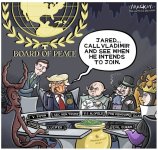

The board was originally thought to be aimed at helping end the two-year war between Israel and Hamas in Gaza and oversee reconstruction but its proposed charter does not mention the Palestinian territory and appears to be designed to supplant functions of the UN.
Trump invited dozens of world leaders to join the board, but many traditional U.S. allies including Britain, France, Norway and Sweden have opted out.
On Wednesday the Vatican also confirmed Pope Leo has received an invitation. Speaking to reporters on Wednesday, the Vatican's Secretary of State, Cardinal Pietro Parolin, said the Pope would need time to consider whether to take part.

 apple.news
A leaked document says the Board of Peace's charter will enter into force once three states formally agree to be bound by it, with member states given renewable three-year terms and permanent seats available to those contributing $1bn (£740m), it said.
apple.news
A leaked document says the Board of Peace's charter will enter into force once three states formally agree to be bound by it, with member states given renewable three-year terms and permanent seats available to those contributing $1bn (£740m), it said.
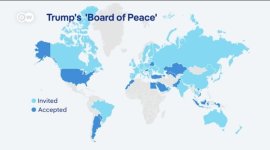
The charter declared the body as an international organisation mandated to carry out peace-building functions under international law, with Trump serving as chairman - and separately as the US representative - and holding authority to appoint executive board members and create or dissolve subsidiary bodies. Thank you for your attention to this matter.
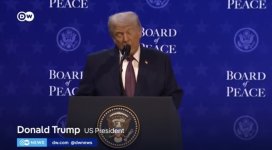
A phrase often repeated in the Board of Peace charter, which Trump officially ratified on Thursday, is that virtually all decisions have to be made with “the approval of the Chairman.”
“It basically puts Donald Trump in this position as a lifetime owner of this new Board of Peace; he appoints people who he wants and as we just saw last night, he disinvites people,” he said.

 www.ctvnews.ca
So far, now 35 countries have agreed to join, including Israel, Argentina, Saudi Arabia, Turkiye, Hungary, and Pakistan. Nader Hashemi, associate professor of Middle East and Islamic politics at Georgetown University argued that most of them did so simply to “suck up” to Trump and further their respective national interests by playing to his ego.
www.ctvnews.ca
So far, now 35 countries have agreed to join, including Israel, Argentina, Saudi Arabia, Turkiye, Hungary, and Pakistan. Nader Hashemi, associate professor of Middle East and Islamic politics at Georgetown University argued that most of them did so simply to “suck up” to Trump and further their respective national interests by playing to his ego.
“What these countries have in common is most of them are dictators and dictatorships in non-democratic states and so there’s a certain affinity in how they think about the world because they think about it through the lens of authoritarianism.”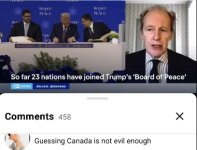
They will join Israel, which also publicly confirmed its participation earlier.

On Wednesday evening Trump said Vladimir Putin had also agreed to join - but the Russian president said his country was still studying the invitation.


The board was originally thought to be aimed at helping end the two-year war between Israel and Hamas in Gaza and oversee reconstruction but its proposed charter does not mention the Palestinian territory and appears to be designed to supplant functions of the UN.
Trump invited dozens of world leaders to join the board, but many traditional U.S. allies including Britain, France, Norway and Sweden have opted out.
On Wednesday the Vatican also confirmed Pope Leo has received an invitation. Speaking to reporters on Wednesday, the Vatican's Secretary of State, Cardinal Pietro Parolin, said the Pope would need time to consider whether to take part.
Seven more countries agree to join Trump's Board of Peace — BBC News
Seven Muslim-majority countries accept an invitation to Trump's new organisation, while Russia's Putin says he's considering joining.

The charter declared the body as an international organisation mandated to carry out peace-building functions under international law, with Trump serving as chairman - and separately as the US representative - and holding authority to appoint executive board members and create or dissolve subsidiary bodies. Thank you for your attention to this matter.

A phrase often repeated in the Board of Peace charter, which Trump officially ratified on Thursday, is that virtually all decisions have to be made with “the approval of the Chairman.”
“It basically puts Donald Trump in this position as a lifetime owner of this new Board of Peace; he appoints people who he wants and as we just saw last night, he disinvites people,” he said.

‘Huge blessing in disguise’ for Carney to be disinvited from Trump’s Board of Peace, professor says
U.S. President Donald Trump’s decision to rescind his invitation for Mark Carney to join his “Board of Peace” for Gaza is good news for the Canadian prime minister, says a professor, as the war of words between neighbouring leaders churns on.
“What these countries have in common is most of them are dictators and dictatorships in non-democratic states and so there’s a certain affinity in how they think about the world because they think about it through the lens of authoritarianism.”

Idiots gonna id.
Apparently, there’s about three dozen countries that are clamouring to get onto this (?), and many that are backing away cautiously or running away fully.

The United States - along with the 26 countries who have so far joined Trump's so-called Board of Peace and in consultation with the Palestinian National Committee that it oversees - will apply pressure on Hamas to disarm, according to the U.S. Ambassador to the United Nations Mike Waltz.

"Hamas must not have any role in the governance of Gaza, directly or indirectly, in any form, period," he told the 15-member council. "All military terror and offensive infrastructure, including tunnels and weapon production facilities, will be destroyed and not rebuilt, etc…
 "International, independent monitors will supervise a process of demilitarization of Gaza to include placing weapons permanently beyond use through an agreed process of decommissioning and supported by an internationally funded buyback and reintegration program," he added, “Like what Canada is doing, but not doing.”
"International, independent monitors will supervise a process of demilitarization of Gaza to include placing weapons permanently beyond use through an agreed process of decommissioning and supported by an internationally funded buyback and reintegration program," he added, “Like what Canada is doing, but not doing.”
His comments reflect point 13 of Trump's 20-point Gaza peace plan.
US tells UN: Gaza demilitarization to include internationally funded buyback program — Reuters
The demilitarization of Gazawill include decommissioning weapons through an agreed process "supported by an internationally funded buyback" program, the United States told the U.N. Security Council on Wednesday.
Hamas recently agreed to discuss disarmament with other Palestinian factions and with mediators, sources have said. However, two Hamas officials told Reuters that neither Washington nor the mediators had presented the group with any detailed or concrete disarmament proposal, so they’ve got that going for them.

(Not to be confused with ICE Agents because about 1/2 of the above are showing their faces)
Hamas remains heavily armed, Israel's U.N. Ambassador Danny Danon told the Security Council. "It still holds thousands of rockets, anti-tank missiles, and tens of thousands of Kalashnikov rifles. In total, Hamas still holds roughly 60,000 assault rifles," Danon said. "These weapons are used not only against Israel but against Gazans who oppose Hamas rule."
The official X account of the Board has begun to welcome the new members. It posted about Argentina, Armenia, Azerbaijan, Albania, Bahrain, Belarus, Bulgaria, Cambodia, El Salvador, Egypt, Hungary, Indonesia, Israel, Jordan, Kazakhstan, Kosovo, Kuwait, Mongolia, Morocco, Pakistan, Paraguay, Qatar, Saudi Arabia, Turkey, the United Arab Emirates, Uzbekistan, Vietnam, and Wadiya. While there is significant overlap in the lists, the new one has more countries than the original, with 26 countries in total. These include Kuwait, which had welcomed the invitation to join back on January 21. Missing from the above is…well, the majority of Europe.
Originally a part of last October’s Gaza cease-fire plan, the Board of Peace has since evolved into a broader scheme that holds enormous potential for corruption. According to its charter, nations wanting a permanent seat on the body must give it “more than USD $1,000,000,000 in cash funds to the Board of Peace within the first year of the Charter’s entry into force.”
Trump himself serves personally as chairman for life and holds more or less total authority over the board’s composition and activities — right now, it includes such luminaries as Secretary of State-slash-National Security Adviser Marco Rubio, the apparently omnicompetent special envoy Steve Witkoff, and presidential son-in-law Jared Kushner. What’s more, Trump will also be able to handpick his own successor.
As a pay-to-play scheme with its membership determined by Trump himself, the Board of Peace will lack even a patina of legitimacy — and it may find it impossible to achieve anything aside from its primary function of enriching Trump himself or its original purpose of supervising the Gaza ceasefire plan.

Trump’s ‘Board of Peace’ is a Corrupt Joke - Progressive Policy Institute
President Trump’s “Board of Peace,” formally launched at the annual confab of the world’s elite at Davos, amounts to little more than perhaps the most ambitious pay-to-play scheme in history. Originally a part of last October’s Gaza cease-fire plan, the Board of Peace has since evolved into a...
www.progressivepolicy.org
One might consider it an abdication of the media's function for it to ignore the most powerful person on the planet. And in case you were unaware, "the media" is not a single entity with a unified policy.If all media quit reporting on Trump, would anyone care? Or even notice what he does?
Thank you but no. New Zealand decided against accepting U.S. President Donald Trump's invitation to join his Board of Peace, New Zealand’s Prime Minister Christopher Luxon said in a statement on Friday. Global powers and traditional Western U.S. allies have been more cautious than those that jumped to curry favour with Trump on this…whatever.
(YouTube & What is Trump's 'Board of Peace' and what will it mean for people in Gaza?

 apple.news
Flawed democracies (7):
apple.news
Flawed democracies (7):
Argentina, Bulgaria, Indonesia, Israel, Mongolia, Paraguay, United States
Hybrid regimes (6): Albania, Armenia, Hungary, Kosovo, Pakistan, Turkey
Authoritarian regimes (13): Azerbaijan, Bahrain, Belarus, Egypt, Jordan, Kazakhstan, Kuwait, Morocco, Qatar, Saudi Arabia, United Arab Emirates, Uzbekistan, Vietnam
Full democracies (0): None among the confirmed members
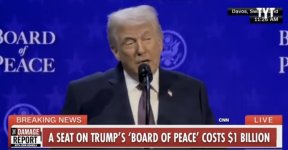
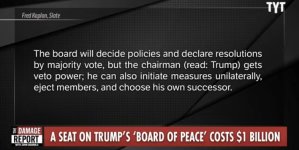
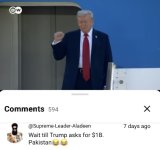
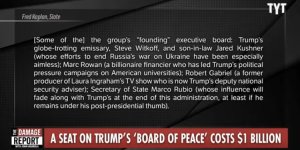
The official X account of the Board has begun to welcome the new members. It posted about Argentina, Armenia, Azerbaijan, Albania, Bahrain, Belarus, Bulgaria, Cambodia, El Salvador, Egypt, Hungary, Indonesia, Israel, Jordan, Kazakhstan, Kosovo, Kuwait, Mongolia, Morocco, Pakistan, Paraguay, Qatar, Saudi Arabia, Turkey, the United Arab Emirates, Uzbekistan, Vietnam, and Wadiya. While there is significant overlap in the lists, the new one has more countries than the original, with 26 countries in total. These include Kuwait, which had welcomed the invitation to join back on January 21. Missing from the above is…well, the majority of Europe.
New Zealand declines invite to join Board of Peace — Reuters
New Zealand decided against accepting U.S. President Donald Trump's invitation to join his Board of Peace, New Zealand’s Prime Minister Christopher Luxon said in a statement on Friday.
Argentina, Bulgaria, Indonesia, Israel, Mongolia, Paraguay, United States
Hybrid regimes (6): Albania, Armenia, Hungary, Kosovo, Pakistan, Turkey
Authoritarian regimes (13): Azerbaijan, Bahrain, Belarus, Egypt, Jordan, Kazakhstan, Kuwait, Morocco, Qatar, Saudi Arabia, United Arab Emirates, Uzbekistan, Vietnam
Full democracies (0): None among the confirmed members




Well at least he's trying to do something about the M.E. Who's to say it won't work. OTOH what happens if it doesn't. Does anyone have any OTHER ideas? Nothing has worked so far, even giving everything (under Arafat) they asked for & it still wasn't good enough, So ???? Trump has at least come up with an idea & if it works great, if it doesn't, we're back to square one. It's gonna be interesting for sure.If all media quit reporting on Trump, would anyone care? Or even notice what he does?